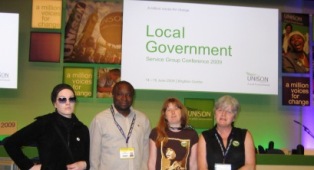Monday 8 June Cabinet Committee
On Monday there was a fantastic turn out for the Cabinet Committee meeting. Over 300 residents largely residents or relatives of people using the Sheltered Housing Service turned up to protest then listen to the debate concerning their future.
Media were there in numbers, local press BBC London, LBC radio and a Panorama film crew!
I agree with the Deputy Chief Executive who in this week’s First team said “……public question time took up the first half hour of the meeting. Strong passions were firmly articulated.”
As Max Boyce used to say ….I was there! But I don’t think that it is fair to describe what is happening with this campaign as simply residents opposed to change. I have long memory and can remember Councillors being rushed into decisions about our residential and day care services for older people against UNISON advice. The same arguments about progress and no change is not an option were used to undermine UNISON’s report to the Council. Needless to say UNISON was right to urge caution, we are currently being taken to court by the Provider who took over our council services. Furthermore we have a ludicrous situation two tier standard, with some Barnet residents in the former council residential homes still living in what was described back in 1999 as unsuitable and other residents in the new homes, all on the same contract. How clever is that?
Back to Sheltered Housing, it is clear residents are scared and are not convinced that this cut will lead to a better service. A lot of work is needed to address these concerns.
Don’t take my word you can listen to the residents yourself
http://www.youtube.com/watch?v=_1YxHg4VkDc
This is a cross party committee specifically to look at what happened to the Councils investment in Icelandic banks. The purpose of this meeting was to select a firm of consultants to carry out an investigation.
The consultants have to carry out a review guided by the Terms of Reference agreed at the Annual General Meeting to view click here
A robust discussion was had. There was cross party consensus for the need for transparency. They are working to a tight timescale as the finished report needs to make the council meeting on 14 July 2009 (one for your diaries!)
And the winning consultancy firm issssssssssss!
For those of you who don’t know. This is the staffing committee. If there is a restructure it has to go in front of councillors here. If your restructure goes there it does not mean the end of consultation. Councillors want to know early if there are going to be any redundancies, so a restructure may have to report back to this committee.
I always advise staff if their jobs are going to this committee they should attend to witness the discussion.
Last night our members working in Registrars came to the meeting to witness a discussion on their restructure. They were clearly disappointed as there was no discussion/questions about their restructure. However they were pleased to hear agreement for an extension to the consultation. After the meeting my colleague Maggi Myland and I gave a de-briefing to our members on how committee works and the consultation process, which they all felt was useful.


